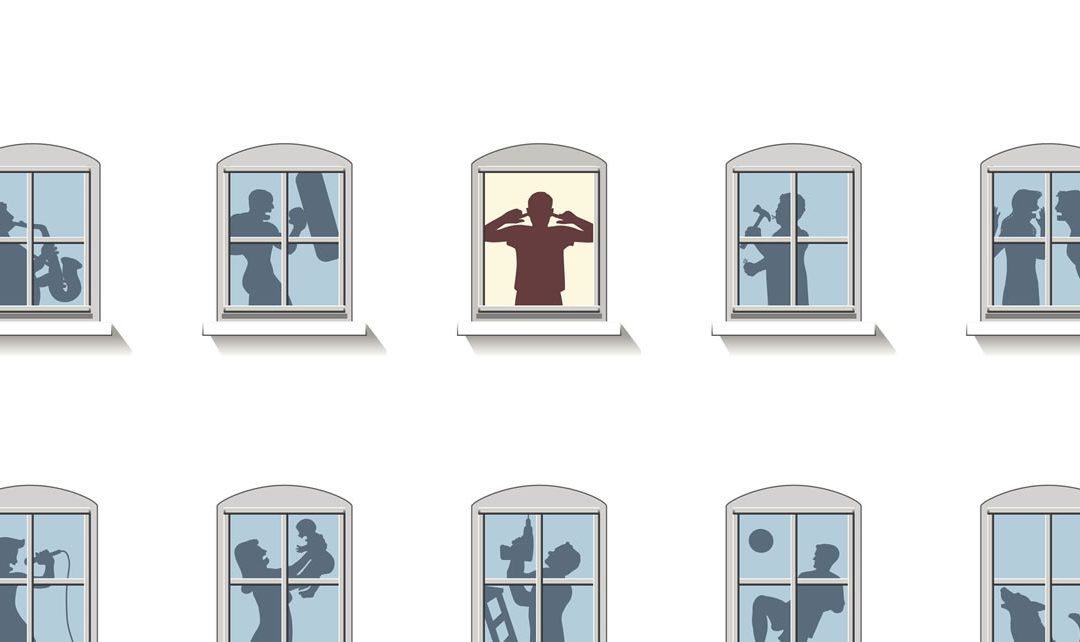If you or your family has ever lived in an apartment, you might have had to deal with a noisy neighbour. The neighbour could be playing loud music, watching television on surround sound, having late-night parties into the morning, using exercise equipment, vacuuming or just deliberately making noise, which disturbs your sleep and overall well being.
What can you do? Who is responsible if the noise and disturbances are occurring regularly?
Property managers could have designated “quiet hours” within the complex. This rule is usually presented and explained to tenants before they sign the lease with proof of understanding. Quiet hours are usually 10 pm to 8 am daily. Even if an apartment does not have these rules, tenants should respect each other’s sleep time. Landlords should make sure that all tenants have the right to rest and sleep before another busy day at work.
In one case, an elderly couple (the tenants) was being disturbed by the neighbour who lived above them. It happened between 11 pm and 6 am for almost a year and a half. The tenants were consistently being disturbed with noises from their bedroom ceiling, which they described as like a hammer striking the hardwood floor, along with scratching sounds like those made by furniture being dragged across the floor.
The couple had been living in the apartment for over 10 years. Since mid-2011, they repeatedly complained to the property manager personnel regarding the ongoing noise. The couple said the neighbour above them moved in approximately four years ago. He was an elderly man and the noise disturbances started after his wife passed away.
The apartment was taken over by a new property manager at the beginning of May 2012. The previous property manager had advised the tenants to create a log of the disturbances. The tenants also made a recording of the noises. The tenants provided the log and recordings to the property manager, serving as agents to the owner landlord, but no action was taken to halt the disturbances.
The tenants filed the same complaints with their new property manager but had no better luck. According to the tenants, the landlord’s response was that they could do nothing to resolve the issue.
The tenants had called the police to file a complaint in April 2011. In January 2012, the tenants filed a complaint to noise enforcement personnel, who came to the complex and directed the property manager to install weather stripping and felt pads under the neighbour’s furniture to eliminate the scratching noises.
After a period of exhaustion with no response, the tenants took legal action against their landlord at Ontario’s Landlord and Tenant Board.
The tenants claimed they were unable to sleep in their bedroom and that they were deprived of sleep. Their lack of sleep and ongoing stress exacerbated their health problems, including heightened blood pressure.
During hearings on Oct. 2, 2012 and Nov. 26, 2012, the tenants presented descriptive logs and tape recordings generated from a microphone placed on their ceiling by their son. Many recordings demonstrated the disturbances between 11 pm and 5:54 am.
The judge concluded after examining the evidence that the noises made by a hammer stuck against the floor were deliberate and intermittent. The dragging of furniture across the floor during the early morning hours before 6 am did not constitute normal sounds caused by normal living activities. The judge said the tenants provided credible evidence that they were interfered with by the upstairs neighbour’s nocturnal activities.
The judge deliberated that under section 22 of the Ontario Residential Tenancies Act, a landlord is obligated to ensure that all tenants are afforded reasonable enjoyment of their units/the residential complex. The landlord must take reasonable and effective action to protect a tenant from being disturbed by a neighbouring tenant. The landlord had probable cause to act on behalf of the tenants, including serving the neighbour a Form N5 notice of termination.
It was also determined that should the landlord fail to comply with the rules, the tenants had the right to a future application to seek a five per cent rent rebate as compensation from the landlord. Unfortunately, the tenants did not file an amount for compensation and could not receive the rebate at the hearing.
Avi Rosen has been a real estate broker for nearly 50 years. He is also a paralegal with a legal focus on the real estate industry. For legal advice on real estate issues, call Avi at (416) 818-6130 or email avi@avirosen.ca.













